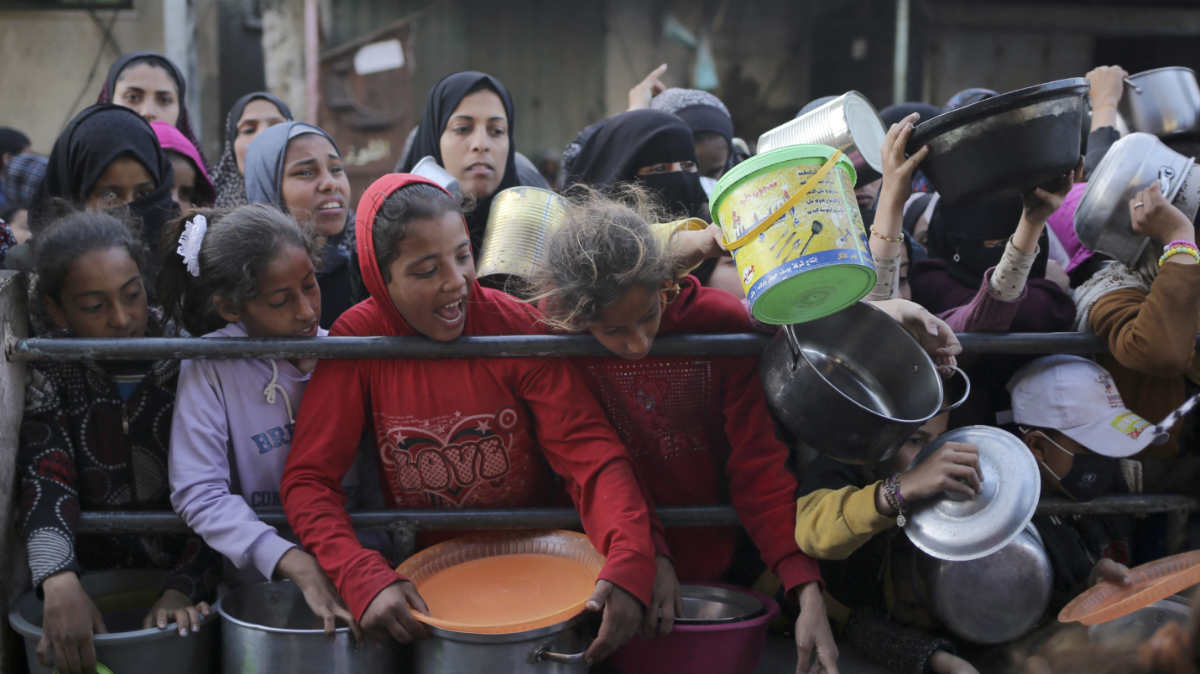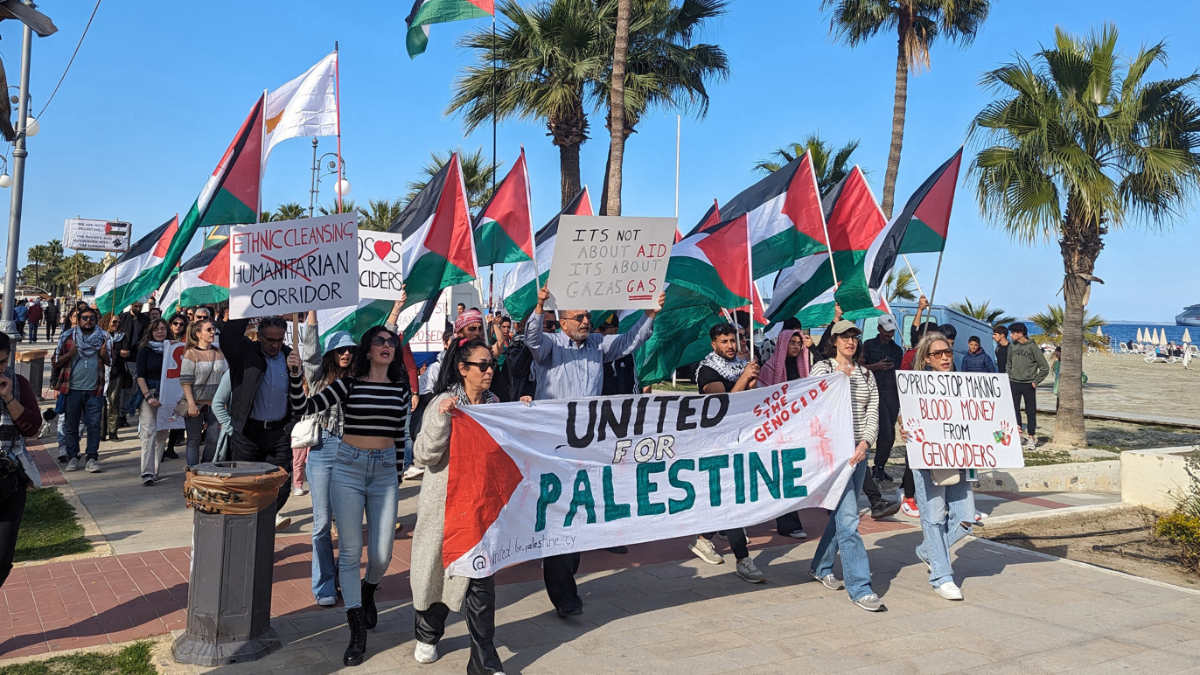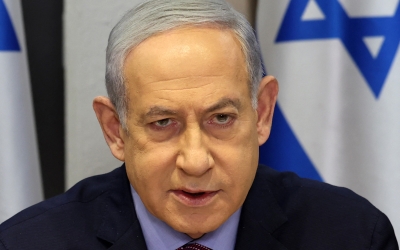During a meeting in January, top European Union diplomats were left dumbfounded when Israel’s Foreign Minister Israel Katz proposed a futuristic artificial island to distribute aid to war-ravaged Gaza.
Months later, US naval ships are steaming towards the Eastern Mediterranean to construct a “floating pier” that is set to receive aid from a real island, Cyprus, and send it onward to Gaza.
“There are similarities between the two ideas,” Shira Efron, director of research at the Israeli Policy Forum, told Middle East Eye.
Katz, who does not sit on Israel’s war cabinet and is known for tiresomely pushing pet projects, may want to take credit for the idea, analysts say. His other proposal – a 21st-century Hijaz railway connecting Israel and Saudi Arabia – was ceremoniously touted by the US just before the war in Gaza erupted.
The floating pier announcement development comes as starvation stalks Gaza. The UN has warned that famine is “imminent” in the enclave’s north, where a US official said Friday it was “quite possibly” already present, as at least 27 children have died of malnutrition and dehydration in the besieged enclave.
“People in Gaza are starving, so they will be encouraged by aid that comes from any place,” Talal Okal, a Gaza City political analyst now based in the UAE, told MEE.
But Okal wonders why Israel has been quick to back the pier since US President Joe Biden announced the project in March, while it is still accused of choking aid at Gaza’s land borders. He believes it echoes Katz’s plan, which he says is designed to consolidate Israeli control over aid to Gaza, not bring in more.
“I think the port will make it convenient for Israel to keep land borders to Gaza closed,” he said.
“In Gaza, all aid is political,” he said.
MEE reached out to Israel’s embassy in Washington DC for comment but did not receive a reply by the time of publication.
‘Points of access’
But there are distinct differences between the US port project and Katz’s plan.
Instead of an artificial island, the US military will construct the floating pier three to five miles off the coast of Gaza. A 1,800-foot floating causeway will be anchored to a Gaza beach. Ships will ferry aid from the staging ground at the Cypriot port of Larnaca to the floating pier. Support vessels will transport the aid from the pier to the two-lane causeway.
Cyprus called for a maritime corridor in the first weeks of the Gaza war. The Mediterranean island nation enjoys close ties to Israel, but also has historic relations with the Palestinians and hopes to position itself as a bridge between the two sides.
Critics have blamed Israel for the trickle of aid entering the Strip, with the EU’s foreign policy chief claiming Israel was using starvation as a “weapon of war” – a claim several human rights organisations have echoed.
Israel ordered a total siege of Gaza after the Hamas-led 7 October attacks on southern Israel when the war broke out, but has denied allegations it is blocking aid, blaming it on aid organisations’ inability to deliver supplies, “lawlessness”, and at times even claiming that Hamas is diverting or stealing it.
Israel announced it would no longer work with Unrwa, the UN agency for Palestinians and the largest aid organisation in Gaza.
The UN’s top court has ordered Israel to ensure the “unhindered” delivery of food and other aid to Gaza, which delivers a legal blow to Israel’s claim that it is not blocking aid. In response, Israel’s foreign ministry pointed to the “new initiatives” it was working on – a reference to the maritime corridor – to bring more food into Gaza.
David Harden, a former US Aid mission director to the West Bank and Gaza, told MEE the maritime aid corridor would help alleviate the hunger crisis stalking Gaza, but should not be used as an excuse to prevent the opening of more land crossings.
“From a humanitarian perspective, you want as many points of access as possible, but the land crossings are everything,” Harden said. “Israel has the means and obligation to prevent a famine in Gaza.”
And the port could also have deeper ramifications for Gaza.
‘Great deal for Israel’
The pier is beneficial to Israel’s war aims, analysts say.
At a time when it is facing growing calls in the West to facilitate more aid deliveries, it allows Israel’s government to approve food deliveries when it is politically unpopular with Israelis at home. Protestors, including some hostages’ family members, have blocked aid crossings.
“The Israelis will insist that they have full visibility on the port,” Harden said. “They will exercise control over it.”
Currently, aid mainly goes to two ports before arriving in Gaza; Israel’s Ashdod and Egypt’s El-Arish. It enters Gaza at a trickle through two crossings: from inside Israel via Kerem Shalom and through Egypt’s Rafah crossing. A tiny trickle of aid has also gone through a northern border crossing.
All deliveries undergo an arduous inspection regime controlled by Israel. Aid is unloaded and reloaded with some trucks making 40-kilometre journeys just to be checked by Israeli troops.
Efron, at the Israeli Policy Forum, who also consults with a UN team in Jerusalem advising on Gaza, said the maritime corridor was attractive to Israel because it allows them to retain overall control of aid deliveries to the besieged enclave while reducing reliance on Egypt and keeping deliveries away from the Israeli public’s view.
She said it underlined Israel’s thinking on Gaza.
“Israel wants to disengage from the Strip, that sounds like a paradox, but it’s true. At the same time, Israel wants to retain overall security control of Gaza.”
“Cyprus is fine with Israel determining the inspections regime and committing to do what Israel tells them security-wise,” she said.
“For Israel, it’s a great deal,” she said.
‘Stop killing children’
Some have criticised the port project as virtue signalling by the Biden administration amid its inability to pressure Israel to surge more aid into Gaza by land. Biden is under fire from progressives and Arab Americans to take a more forceful stance against Israel ahead of the US elections.
Jose Andres, the celebrity chef whose NGO World Central Kitchen (WCK) began shipping hundreds of tons of food to Gaza from Cyprus in March, also criticised the US proposal, saying the Biden administration needed to start demanding that Israel “stop killing children, targeting humanitarian volunteers and press! [And] open more routes by road into Gaza.”
He said the US military-led mission “doesn’t make sense” with aid stuck at land borders and would not be welcomed by the people of Gaza.
On Tuesday, an Israeli air strike killed seven WCK workers in central Gaza and has since dominated discourse surrounding Israel’s conduct in the war. The organisation said the strike took place despite coordination with the Israeli military about its movements and on Wednesday Andres said Israel “systematically” targeted aid workers. It has suspended all operations in Gaza and several other aid organisations have followed suit, saying it is simply unsafe.
The US is working in tandem with the UN and Gulf states on the maritime corridor. A western official familiar with the ongoing talks pushed back on the narrative that the aid corridor would allow Israel to side-step lifting restrictions on aid to Gaza.
“The UN does not play politics with aid,” the official said.
The US’s decision to build the maritime corridor comes after more than two decades of Israel opposing the construction of a major port in Gaza. The besieged Mediterranean enclave’s small fishing port near Gaza City’s Rimal district was destroyed by Israeli bombardment after 7 October.
Israel has imposed a naval and air blockade on the Gaza Strip since 2007, after Hamas seized control of the enclave from the Palestinian Authority following its victory in Palestinian elections.
Israel is engaged in bloody fighting against Hamas, which continues to put up stiff resistance against its troops on land. But Israel has unfettered military control over Gaza’s sky and sea. Delivery of aid by air drop or ship requires Israel’s de facto consent.
Israel’s offensive on Gaza after the Hamas-led 7 October attacks on southern Israel has killed more 32,000 Palestinians, mainly women and children. Tribal leaders in Gaza have rejected Israel’s overture to secure and distribute aid.
Okal believes Israel agreed to the pier as a way to displace Palestinians from Gaza via the Mediterranean, ahead of an expected military assault on Rafah, the southern Gaza border town where about 1.4 million Palestinians are sheltering.
“There are more corridors, better, faster, and cheaper via land. This [the port] is a way to help the Israelis fulfil their goal of displacing Palestinians after their failure to push them into Sinai.”
The western official familiar with the maritime corridor called that explanation “an exaggeration”.
US footprint
But skeptics aside, the project has raised eyebrows in Washington.
Some members of the intelligence community and Defence Department have warned the White House that US military personnel could be targeted by Hamas or other Palestinian fighters as they build the pier or deliver aid. Over 1000 US troops and four army vessels are tasked with the project.
Biden has promised no US troops will be on the ground and said that the Israeli military will provide security.
“We are gravely concerned that the Department of Defense has given too little consideration to the likelihood that Hamas, Palestinian Islamic Jihad (PIJ), and other US-designated terrorist organizations operating in Gaza would attempt to attack the US personnel that will be deployed to this mission,” Republican Senator Roger Wicker and other Republican lawmakers wrote in a letter to Biden last week.
“All it takes is one terrorist with an RPG to hit our guys. Then what do we do?” A US defence official told MEE, speaking on condition of anonymity. “Do we retaliate against Hamas? Are we now a combatant in Gaza?”
US troops operating on the causeway could also face a dilemma if there is an incident while Palestinians try to retrieve aid. Last week 12 people drowned trying to salvage aid dropped into the sea, and others have been killed by falling packages.
If the port project steams ahead and Israel continues to tightly restrict aid into Gaza via land, the US also runs the risk of being seen as providing cover to Israel’s offensive, at a time when Washington is trying to build consensus in the Arab world for a postwar Gaza governance plan.
The US State Department didn’t respond to MEE’s request for comment on this article.
The port project is being backed by Cyprus, the UK and EU. The United Arab Emirates and Qatar are the only two Arab countries publicly participating, while Egypt has “welcomed” the opening of the corridor.
Post Disclaimer
Disclaimer: War on Gaza: Maritime aid corridor fuels suspicions about post-war plans By Sean Mathews - Views expressed by writers in this section are their own and do not necessarily reflect Latheefarook.com point-of-view



